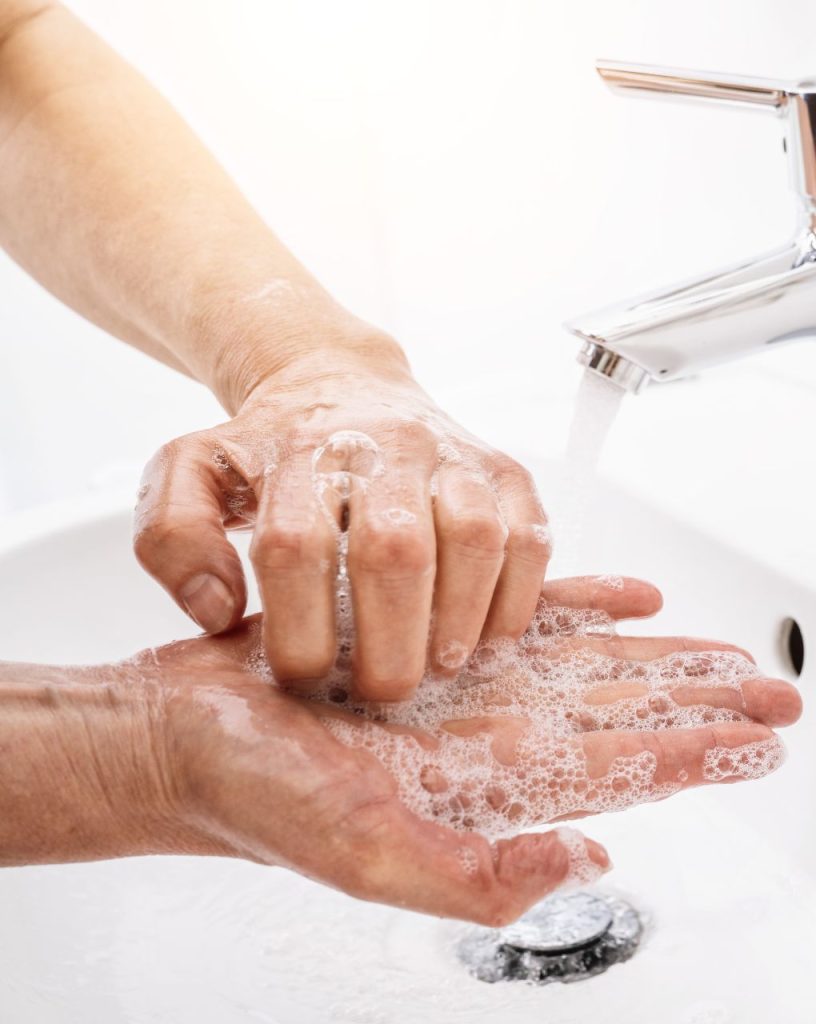- Home
- Health Topics
- Infectious Disease — Prevention and Control
- Infection Control— How We Can All Contribute
Infection Control— How We Can All Contribute
What you can do
Most people get sick by touching something with germs on it and then touching their eyes, nose or mouth. Germs can also enter our body in food or water or by breathing them in.
Follow these steps to help prevent the spread of germs, and reduce your risk of catching and spreading infections

Wash your hands
Your hands are the most common way for germs to spread. Proper hand washing with soap and water is the best way to prevent the spread of infections.
When to wash your hands
Clean your hands with soap and water or an alcohol-based sanitizer often, and especially:
- Before eating or handling food
- After using the washroom
- After blowing your nose, coughing or sneezing
- After touching animals or animal waste
- After handling garbage
- After changing diapers
- Before and after touching a sick or injured person
- Before and after visiting a hospital, school or long-term care facility
How to wash your hands
Washing your hands with soap and water is the best way to stop the spread of infection. Follow these steps:
- Wet your hands with warm water
- Apply soap and rub your palms together to form a lather
- Rub the lather all over the top of your hands, in between your fingers and the areas around and under your fingernails
- Continue rubbing for at least 15 seconds (try singing the ‘Happy Birthday’ song twice)
- Rinse your hands well under running water
- Dry your hands using a paper towel if possible and use your paper towel to turn off the water
If soap and water are unavailable, use a hand sanitizer with at least 70% alcohol or isopropanol. Follow these steps:
- Apply one or two pumps to your hands
- Rub hands together, palm to palm
- Rub sanitizer all over the top of your hands, in between your fingers and the areas around and under your fingernails
- Rub until your hands are dry (15-30 seconds)
View/download the steps for how to wash your hands from Ontario Public Health.
Cover your coughs and sneezes
Use a tissue to cover your mouth and nose when you cough or sneeze. Throw the tissue in the garbage or laundry immediately and clean your hands.
If you do not have a tissue, cover your cough or sneeze in your upper arm or sleeve, not in your hands.
Clean and disinfect surfaces
Cleaning means to remove dirt and germs using friction, soap or detergent, and water. Disinfecting means to kill germs by using a chemical solution such as chlorine bleach. Both are important to stop germs from spreading and making you sick.
Surfaces to focus on
Clean and disinfect surfaces that are touched often or that may have come in contact with germs:
- Handles, remotes, light switches
- Areas where people or animals go pee or poop
- Areas where diapers are changed
- Areas where food is prepared or eaten
- Cots, cribs, linens
- Play mats
- Toys, craft and sensory play tables
- Outdoor play areas
- Common areas
How to clean
- Wet the surface with clean water and/or detergent
- Scrub to loosen dirt and debris
- Use clean, warm water to remove soap, dirt and debris
- Air dry or wipe dry with a clean towel
How to disinfect
Disinfect clean surfaces using one of these four methods:
- Spray the surface with an approved disinfectant
- Wipe the surface with a disposable disinfectant wipe or a clean cloth moistened with a disinfectant solution
- Soak the object in a container of disinfecting solution for several minutes and then remove the object and allow it to air dry
- Wash and disinfect in a commercial dishwasher
How to mix bleach and water for disinfecting
For day-to -day disinfecting for countertops, floors, walls, washrooms, tables, toys and diaper change areas:
- Slowly add 2 teaspoons (10 ml) of bleach to 4 cups (1,000 ml) of water. Leave on surface for 2 minutes
During sickness with vomiting and diarrhea:
- Slowly add 4 teaspoons (20 ml) of bleach to 4 cups (1,000 ml) of water. Leave on surface for 10 minutes.
More information about using bleach to clean and disinfect
Get immunized
Immunization and vaccines protect against many serious infections.
Stay home when you’re sick
Adults and children need to stay home if they are feeling unwell. COVID-19 school screening (https://covid-19.ontario.ca/school-screening/) must be completed every day before school. The screening tool will outline what steps to take if you fail the screening.
Don’t share personal items
Don’t share items that have been in other people’s mouths or that may have come in contact with bodily fluids (e.g., toothbrushes, water bottles, unwashed utensils, drug use equipment, and items used during sexual activity).
